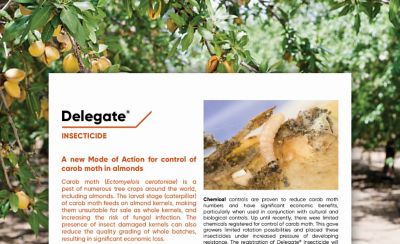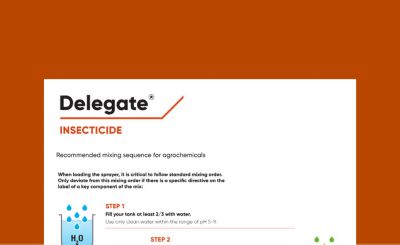Western Flower Thrip (WFT) are damaging pests of pome and stonefruit throughout Australia. Since their introduction to Australia in the 1990’s, they are now considered to be harder to control than other thrip species due to their high reproductive rate and ability to rapidly build up resistance to many insecticides.
Western Flower Thrip infest tree crops early in the season and begin feeding on the developing leaves, flowers and young fruit causing the surrounding tissue to die. Visible symptoms include scarring, spots and dimpling, while silvering on the fruit tends to be an indication of later season infestation and feeding. Any damage of this nature will have a detrimental economic impact on the crop.
Orchardists in the Goulburn Valley have relied on Delegate® Insecticide for many years to protect their crops from WFT and consider it as the ‘go-to’ insecticide when faced with heavy pest pressure at critical times in the season.
Delegate contains a unique active ingredient, Jemvelva® active (Spinetoram), belonging to the Group 5 Mode of Action Group. Derived from a naturally occurring soil bacterium, Jemvelva® active's low toxicity and high margin of safety helps to support OH&S on-farm whilst providing effective control of WFT.
“Delegate is highly effective for early season control of WFT and is selective to key predatory insects such as lacewings and ladybird beetles making it a great fit into IPM programs,” said Gregg Baynon, Territory Manager for Corteva Agriscience™. “Having beneficial insects present in the crop adds another level of protection from damaging pests and can help to reduce the number of insecticides required per season”. In addition to WFT, Delegate also provides excellent control of caterpillar pests such as codling moth, oriental fruit moth and light brown apple moth making it a suitable rotation partner in a resistance management programme for these pests.
Delegate Insecticide is relied upon to effectively control WFT but over-use can accelerate the early onset of resistance. It is therefore critically important to adhere to appropriate management strategies to slow the possible development of insect resistance.
Growers need to consider rotating insecticides according to their mode of action. Pests exposed to the same mode of action time after time will eventually develop resistance. By changing mode of action, growers can ensure that any of the pest population developing resistance to one mode of action are effectively controlled by another mode of action. “Adopting effective resistance management strategies with Delegate ensures that Western Flower Thrip control will be effective for years to come” said Gregg. Apply a maximum of three sequential applications of Delegate at a rate of 20g/100L before switching to an approved product from another chemical group. The spray interval between Delegate applications will depend upon the temperatures being experienced – if average daytime temperatures are below 20°c then apply at 6 – 12 day intervals but shorten the gap to 3 – 5 days if temperatures are above 20°c.
Other resistance management strategies include the utilisation of non-chemical control options such as biological and cultural control methods. It is important to monitor the orchard and only spray when economic spray thresholds are exceeded. Using selective insecticides with low environmental toxicity such as Delegate will help encourage biological control and promote a healthy and sustainable orchard.
Most recent articles
- New fungicide option assisting sustainability goals at Banrock Station Agronomy • 27/3/2025
- New registration for Trezac® Arylex® active helping graziers extinguish fireweed Agronomy • 24/3/2025
- Quality is the key for WA family farm Agronomy • 18/3/2025
- Two solutions combined to help maize growers gain the Edge over Fall armyworm Agronomy • 24/10/2024
Additional Resources

Delegate Jemvelva active Insecticide
For the control of various pests in grapes and Pome and Stone fruit as specified in the Directions for Use.
Product details
Delegate - Carob Moth control
Cultural, biological and chemical control of Carob Moth in Almonds.
View now